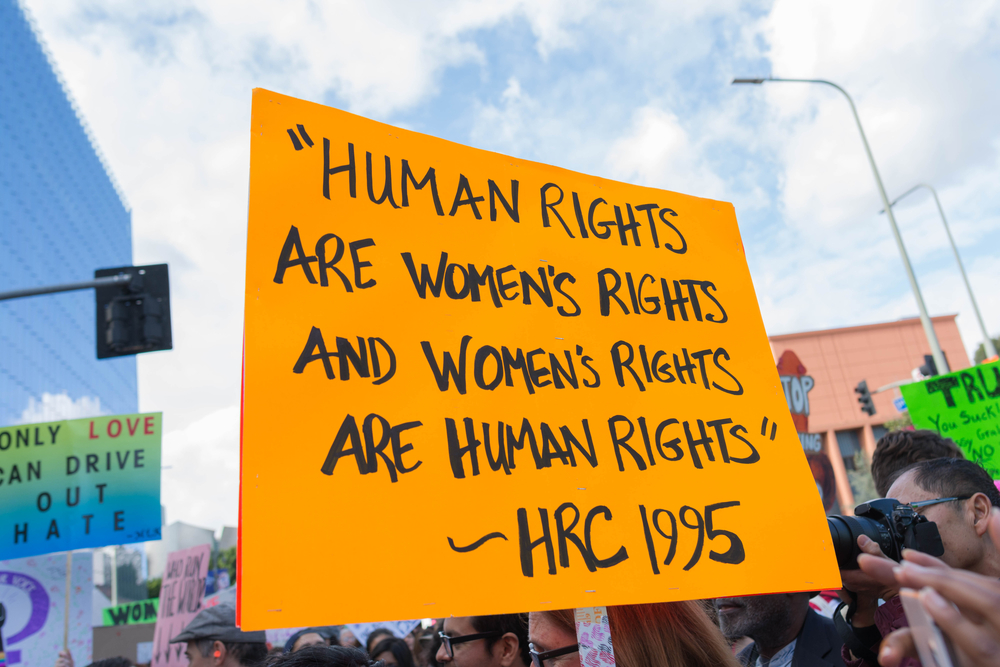Today, November 25, is the International Day for the Elimination of Violence Against Women and Girls, and the United Nations (UN) theme for this year is “Leave No One Behind – End Violence against Women.”
November 25 marks the 1960 assassination of the Mirabal sisters in the Dominican Republic. Minerva, Patria, and María Teresa were powerful, passionate political activists who agitated against the dictator Rafael Trujillo, printing pamphlets that detailed his crimes and stockpiling firecrackers to create bombs. Fearing their influence and determination, Trujillo had them assassinated. Latin American feminists mobilized around their cause, and pushed the United Nations to establish this day – both as a way to commemorate the Mirabal sisters’ bravery, and more importantly, as a way to ensure their work continued across the globe.
While this day is important for raising awareness and remembering the women who fought for a better world, it’s is also meant to kick off 16 days of practical activism. The UN has chosen to highlight five specific manifestations of gendered violence – Intimate Partner Violence, Sexual Violence and Harassment, Human Trafficking, Female Genital Mutilation, and Child Marriage – and they’ve also devoted specific days over the next two weeks to highlighting the disproportionate violence against certain groups of women.
Below I’ve listed a few small, practical steps – mostly by calling your legislators, or donating to organizations – that you can take to try and curb violence against women in the United States. This list is very limited, and there are dozens of other ways to get involved; I’d encourage you to explore all these issues further. But I did want to give everyone a small starting point. Lord knows we have a bajillion things to call our representatives about right now, so I wanted to make it just a touch easier to advocate for these issues over the next 16 days.
- Intimate Partner Violence.
One of the most important things you can do for women who suffer from intimate partner violence in the United States is advocate for better gun control. As Everytown for Gun Safety wrote, “a majority of fatal domestic violence is committed with firearms” and “at least 52% of American women killed with guns are killed by intimate partners or family members.” Women are far, far more likely to be killed by intimate partner violence when there’s a gun involved. - Sexual Violence and Harassment.
Are you a manager at your job? Check with the human resources (HR) department to ensure that they have established harassment reporting procedures, and inquire what those are. If they don’t, or if the procedures seem inadequately written or publicized at the company, ask them to do better for your employees. Are you a member of a union? Advocate for your union to establish guidelines for reporting sexual harassment/violence.
You can also donate to RAINN, an organization which supports victims of sexual violence. - Human Trafficking.
There are a number of organizations that provide safe houses, legal aid, and therapy for human trafficking victims, and they could always use your money or time. These include Safe Horizon (New York City), Polaris Project (Washington, D.C.), Not For Sale (San Francisco), and many more. You can also donate to any legal aid group which helps victims with their applications for the T-visa for trafficking victims.
In addition, you can call your representatives to ask why only 5,000 T-visas are available each year, when the U.S. government estimates that 14,000-15,000 people are trafficked into the United States each year. Lastly, you can call your representatives to advocate for stronger labor protections. It’s no coincidence that most human trafficking in the U.S. occurs in industries which are either illegal (such as sex work) or exempt from federal labor protections (such as live-in domestic workers). - Female Genital Mutilation.
Female genital mutilation is not as common in the United States as in some other countries, but it happens here and it is on the rise. Although female genital mutilation is a federal crime, 24 states still don’t have any state-level laws banning it. You can see whether your state is one of those that’s missing these laws, and whether it’s considered a high-risk state, at the AHA Foundation website. There you can also donate to the foundation or discover which specific bills are being considered in your state, so that you know what to call your state legislators about. - Child Marriage.
As the United Nations reports, child marriage “usually means an end to girl’s education, vocation and her right to make life choices. Research confirms that girls who marry in childhood are at greater risk for intimate partner violence than girls of the same age who marry later.” And yet, between 2000 and 2015, more than 200,000 minors were legally married in the United States, with 90% of those minors being girls. Most of these marriages were facilitated by state laws, so it’s important to call your state legislators to close the loopholes. The Tahirih Justice Center has published a state-by-state report, accurate as of September 2017, which will let you know which protections your state is missing, so that you can call your legislator accordingly. - November 27: Spotlight on Violence against Indigenous Women and Girls.
Native American women face higher levels of gendered violence for a multitude of shameful reasons, but one issue where you can press your elected officials is the question of tribal sovereignty and jurisdiction. Rape and abuse cases which involve non-Native assailants and Native victims can often fall into infuriating legal loopholes which make it impossible for the tribe to prosecute. This is because a 1978 Supreme Court case ruled that Native courts had no jurisdiction over non-Native defendants. Fortunately, the Supreme Court recently reasserted the rights of Native courts in a 2015 decision, but it’s worth asking your legislators and your attorney general how they plan to address this loophole without violating tribal sovereignty. How are state detectives cooperating with Native authorities?Do they routinely offer to share their resources? Our elected officials are only sleeping on this issue because they think no one cares about it.
You can also donate to the National Indigenous Women’s Resource Center or other organizations that put Native women first. - November 29: Spotlight on Women Human Rights Defenders.
This day seems devoted to remembering women activists and highlighting their work, so we’ll be sure to post something here on TMS! - December 3: Spotlight on Violence against Women with Disabilities.
As many researchers and organizations, including the National Disability Authority and the U.S. Office on Women’s Health, acknowledge: “women with disabilities are more likely to experience domestic violence, emotional abuse, and sexual assault than women without disabilities.”
You can donate to ADAPT, the grassroots disability rights organization that was so active during the Trumpcare nightmare; they fight to ensure that federal policy is applied and written inclusively, to address the needs and rights of disabled Americans. If you donate to a local women’s shelter, be sure to ask how they’re including the needs of disabled women in their advocacy or at their facilities. - December 7: Spotlight on Violence against Women in Rural Communities.
Rural women in the United States are more likely to marry young and are more likely to experience intimate partner violence than women who live in the suburbs or cities. The causes of this discrepancy are many – isolation, fewer victim resources, and limited options – and so the remedies are structural and complicated, but there are some options. One way is to donate to organizations which focus on improving general access – roads, job opportunities, digital connectedness – in rural areas like Appalachia, in order to address the root causes. You can also try to call and earmark your donations to a local city or suburb shelter to specifically pay for advertising their services outside the city. (Some shelters are cool with this; others won’t let your designate what your donation goes toward. It’ll depend.) Rural women can’t ask for resources they don’t know exist.
These suggestions are just a start, but I hope they help you to make some time to advocate for women and girls over the next few days. Please feel free to share your own favorite resources and ways to advocate in the comments, especially if you have knowledge of what to do in countries outside the U.S. – or if there are any organizations you work with who you know do great work.
(Featured image via Shutterstock)
Want more stories like this? Become a subscriber and support the site!
—The Mary Sue has a strict comment policy that forbids, but is not limited to, personal insults toward anyone, hate speech, and trolling.—









Published: Nov 25, 2017 12:40 pm